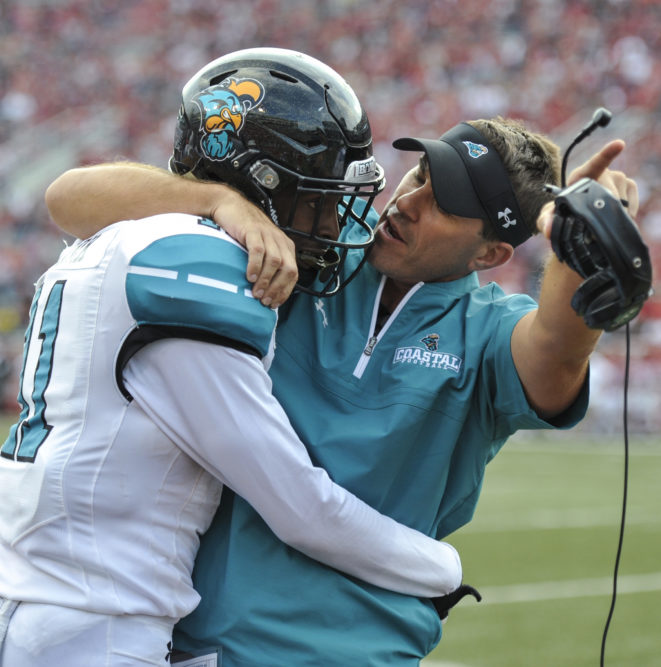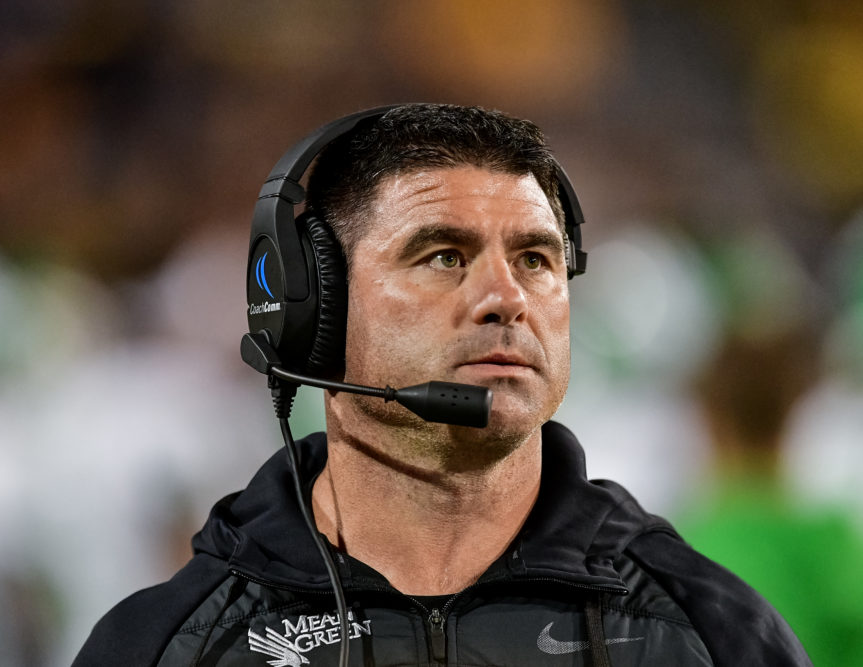For SigEp brothers Jamey Chadwell, East Tennessee State ’99, and Seth Littrell, Oklahoma ’01, the pandemic has proven to be the ultimate work/life balancing act. Even as they adapted to the new normal of quarantining at home with their families, social distancing and working remotely, neither lost sight of their shared professional goal: success in the highly competitive world of college football.
From the outset, Chadwell, the head football coach at Coastal Carolina University, embraced virtual team and academic meetings and workouts as a way to stay in close contact with players and staff. “It didn’t change much as far as what we do; it changed more in how we do it,” he said. “We used a lot of FaceTime for recruiting and with coaches to talk ball.” He added, “We would send the team weekly quotes to encourage and keep them focused on what’s important.”

For Chadwell, now in his second full season as head coach, focusing on the things you can control has been an important element to coaching in the pandemic. He added, “My motivation comes from staying positive and believing that we will overcome this. That helps me every day, knowing that we will eventually be back to normal.”
Despite the unusual circumstances this year, Chadwell couldn’t wish for better results for the team. The Chanticleers are 11-0 this season, improving on a 5-7 record in 2019. His name’s been mentioned frequently over the years as prestigious head coaching positions have come open, and Coastal Carolina’s phenomenal run this year only increased the chatter. Chadwell’s responded to questions about his future with grace and humor, while mostly focusing on the here and now. Even so, some fans were surprised when he recently signed a contract extension to continue coaching the Chanticleers through 2027. It’s been a season full of events no one could predict.
Take Coastal Carolina’s scheduled game with Liberty University, for example. When Liberty bowed out due to an increase in COVID-19 cases, the Chanticleers faced an unexpected matchup at home against powerhouse Brigham Young. The Cougars were also undefeated and had handily beaten their first nine opponents. But when the dust settled, it was the Chanticleers who walked off the field with a 22-17 victory, stopping BYU one yard short of the endzone in the final seconds. It was made even sweeter because ESPN’s “College GameDay” pregame show was on location broadcasting from the South Carolina school for the first time ever, with some analysts calling it “the game of the year.”
In another twist, a Coastal Carolina player tested positive prior to the team’s game against Louisiana for the Sun Belt Conference title. The matchup was canceled, and the two teams were named co-champions. The Chanticleers are now set to face Liberty in its first-ever bowl game, the FBC Mortgage Cure Bowl, on Dec. 26.
There’s no question that Chadwell has done an outstanding job with the team. But he’s also aware that his players and staff stayed largely healthy in a season when others didn’t. The combination of good health and good conditioning made the team ready for the best season in the program’s history. As he stated prior to the cancellation of the initial game against Liberty, “We had a door, we had an opportunity to open it, and we’ve kicked it down to take advantage of it.”
Littrell has also risen to the challenge of leading and inspiring his players during the pandemic. As head football coach at the University of North Texas for five seasons, Littrell has experienced a great deal of success, including three bowl appearances and a Conference USA West Division title.

When the pandemic started, he focused on helping the team and coaching staff navigate this unexpected turn of events so they could be ready mentally and physically to return to the classroom and the field. Zoom meetings and workouts allowed Littrell, players and coaches to maintain a daily connection early on when they couldn’t meet in person. He knew it was not only important for them to continue speaking on a regular basis, but for them to be able to see each other as well. He also began to place a greater emphasis on the importance of communication.
“I think it’s helped some of our guys become better communicators,” he said. “It’s an important skill to have in order to make sure you’re expressing your needs and taking ownership and personal accountability.”
Practices and games have since resumed, but Littrell and the rest of the college football community are still dealing with a fluid situation. Safety protocols have meant North Texas and a number of other teams have had games postponed hours before kickoff because of the uptick in the number of infections. Preparing, then being unable to play, has been frustrating.
But through it all, Littrell has endeavored to keep a positive attitude. “Things may not always go according to plan, but we have to goal-set for ourselves,” he said. “We have a consistent goal to go out each year and compete for championships. When you’ve set a goal, it’s not hard to stay motivated.”
It’s not just about winning, though. He added, “Coaching’s about building relationships, letting players know you care about them, their families, what they’re going through. I don’t think I could go out there and coach my guys hard if they didn’t know I cared about them.”

That’s an idea Ryan Blanck, Western Michigan ’02, likes to call “coaching with love.” Blanck is also a coach, but unlike Chadwell and Littrell, he doesn’t work with athletes.
Blanck’s company, Deviate, specializes in what he calls “performance coaching.” He’s worked with college coaches, the NFL and several NFL executives to determine how they can perform at an even higher level. He said that for a coach to bring out the best in someone, it’s necessary for them to establish a connection and bond of trust.
Using these principles, Blanck is leading two national officer transition retreats in December and January, where SigEp chapter leaders will learn the keys to setting goals for the year ahead and coaching their fellow brothers and executive board “teammates.”
“Coaching is really about getting the most out of people and determining how you can help them work through things in real time and create an intentional culture,” he stated.
Chadwell echoed similar thoughts about the important role relationships play in coaching. He also noted that his leadership style has been influenced by his time as a member of the Tennessee Gamma chapter. “I believe the virtues of being a balanced man have helped me, and I try to incorporate that into how I teach players to grow through football into men,” he said.









Leave a Reply